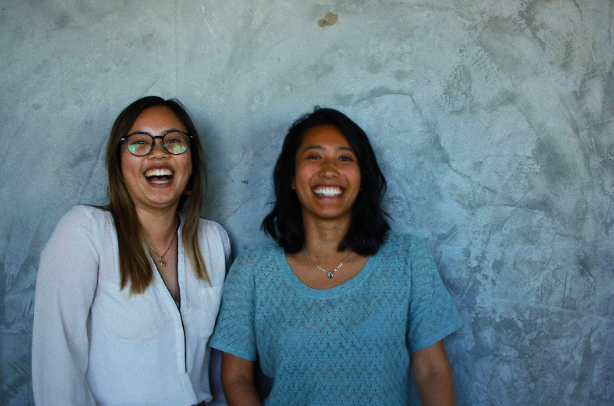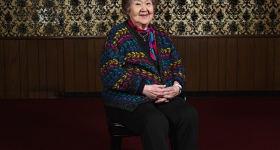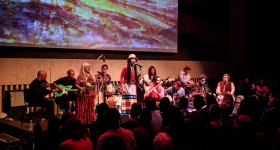Forty-four years ago on April 17, 1975, Khmer Rouge forces entered Cambodia’s capital seeking to implement an agrarian revolution. Families were torn apart and forced into labor camps throughout Cambodia’s countryside. Between 1975 and 1979 under Khmer Rouge rule, over 2 million Cambodians perished from torture, death, starvation and forced labor. The Cambodian Genocide, also known as “The Killing Fields,” has shaped the lives of Cambodians at home and abroad.
Today, Cambodians in the diaspora are emerging beyond the identity of the genocide. We are in a moment of a cultural renaissance — from music and the arts to food and crafts, to education and tech. There is an energy and life that is taking shape in our community. I wrote this letter to Cambodia, reflecting on our growth as a community in America.
* * *
Last night I saw you sitting next to my bed, whispering lullabies in a language that has since left my tongue. Mama was in her late 20s the last time she pressed her feet against the softness of your soil. When the Red Soldiers arrived, the cities burned. Mama had no choice but to flee. I imagine Mama cried her heart out when she left. Or maybe she held those tears in and kept them away, safe in the deepest part of her chest — saving them for the day she’d return.
I spent my childhood searching for you. In the books we brought with us from the Refugee Center in the Philippines. In the prayers Mama whispered at night while we all slept. In those photo albums buried beneath paper, clothes and dust in the top drawer in Papa’s bedroom.
Back in those days, I was too young to understand concentration camps, families starving to the bone, child soldiers with AK-47s, monks in saffron burning in the streets, Chankiri Trees with babies smashed against the trunks, skulls piling to the sky while the Mekong ran red.
Back in those days, the only thing I knew was the feeling of you. And I felt like your gravity would bring me home someday. I was 25 when we finally met. I had traveled across the Pacific to bury my grandmother. And there you were.
You were smiling. But there was a deep sadness in your eyes. You missed us, it had been too long. I saw the scars they left on you and dropped to my knees. You’d fought tooth and nail to keep the Red Soldiers from capturing your soul. You told me that you kept us in your heart to survive those times. Oh, how much you must have suffered. We had fled when the dark clouds rolled in. You stayed because you were resilient. You knew that the nightmare would soon fade.

Even in the whirlwind you made sure to shelter us. You gave rise to a people that withstood. That carried you with them. A people that remembered to dance — fingers twisting into lotuses, Apsaras moving to the rhythm of Ancient Angkor. To celebrate — yellow strings tied around wrists, hoping the blessings of the generations before us would continue forward. To love — babies wrapped in kramas carried on mothers' backs in rice fields and factories, listening to ancestor songs.

Some four decades later, here we are. Did you get the last postcard I sent you? Our family has grown. The last time you saw, Mama, there were only four of us; now there are eight. We’ve become activists, artists, doctors, lawyers, renowned chefs, engineers, musicians and working-class folk raising our families the best we know how.
Some of us are still trying to find our way. The bad dreams haven’t left, they’ve followed us here. Not all of us are able to let go. Some of us are lost in the streets, stuck in steel cages and destroying ourselves because we look so much like those demons that chased us from our homes. Yet through it all, we still keep you in our thoughts.

The old folks are still gossiping, still waiting for the green grass to grow. When Grandma was alive she’d ask me to walk her down Dixon Street to stretch her legs, to breathe the air, and to watch the busyness of life in this small part of America. The streets were concrete and cracked — nothing really bloomed here but the children. All the way from the BART station to the house, she told me to listen to Mama. When Grandma’s friends visited us, I’d eavesdrop. They’d talk about home, about you, about the children.
Last month we were all in the streets, from Oakland to Providence, trying to keep our families together. Can you believe it? After all the storms we’ve weathered, they want to tear apart our home again.

The monks are praying. In April we celebrated the New Year. I saw Mama dancing. Do you remember the last time she danced? I even heard her singing. She sang a lullaby in a language that has since left my tongue and I fell asleep dreaming of our tomorrows.

Take Action
Since 2002, Immigrations and Customs Enforcement (ICE) has carried out a series of devastating raids on Southeast Asian refugee communities. The current administration is ramping up deportations of refugees. Many across the country have been mobilizing to end deportations. Grassroots organizations such as the Southeast Asian Freedom Network (SEAFN) and the Southeast Asia Resource Action Center (SEARAC) are working nonstop to keep families together. If you or a loved one is facing deportation proceedings, please call (415) 952-0413 or visit searaids.org for more information. #KeepFamiliesTogether
Photos by Seng So.













Comments